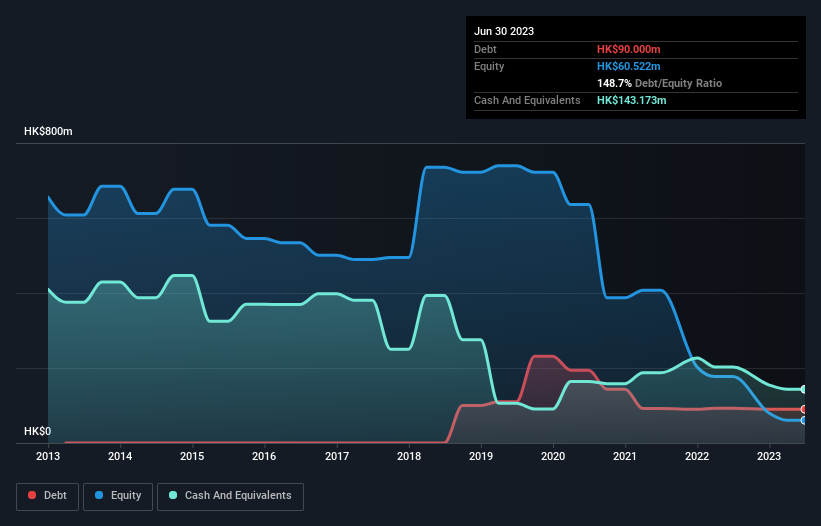
Legendary fund manager Li Lu (who Charlie Munger backed) once said, 'The biggest investment risk is not the volatility of prices, but whether you will suffer a permanent loss of capital.' So it might be obvious that you need to consider debt, when you think about how risky any given stock is, because too much debt can sink a company. We can see that Bison Finance Group Limited (HKG:888) does use debt in its business. But the real question is whether this debt is making the company risky.
When Is Debt Dangerous?
Debt and other liabilities become risky for a business when it cannot easily fulfill those obligations, either with free cash flow or by raising capital at an attractive price. Ultimately, if the company can't fulfill its legal obligations to repay debt, shareholders could walk away with nothing. However, a more usual (but still expensive) situation is where a company must dilute shareholders at a cheap share price simply to get debt under control. Of course, plenty of companies use debt to fund growth, without any negative consequences. When we examine debt levels, we first consider both cash and debt levels, together.
View our latest analysis for Bison Finance Group
How Much Debt Does Bison Finance Group Carry?
As you can see below, Bison Finance Group had HK$90.0m of debt, at June 2023, which is about the same as the year before. You can click the chart for greater detail. But it also has HK$143.2m in cash to offset that, meaning it has HK$53.2m net cash.

A Look At Bison Finance Group's Liabilities
The latest balance sheet data shows that Bison Finance Group had liabilities of HK$116.7m due within a year, and liabilities of HK$7.48m falling due after that. Offsetting these obligations, it had cash of HK$143.2m as well as receivables valued at HK$32.3m due within 12 months. So it actually has HK$51.3m more liquid assets than total liabilities.
This luscious liquidity implies that Bison Finance Group's balance sheet is sturdy like a giant sequoia tree. With this in mind one could posit that its balance sheet means the company is able to handle some adversity. Simply put, the fact that Bison Finance Group has more cash than debt is arguably a good indication that it can manage its debt safely. When analysing debt levels, the balance sheet is the obvious place to start. But it is Bison Finance Group's earnings that will influence how the balance sheet holds up in the future. So if you're keen to discover more about its earnings, it might be worth checking out this graph of its long term earnings trend.
In the last year Bison Finance Group had a loss before interest and tax, and actually shrunk its revenue by 92%, to HK$3.7m. To be frank that doesn't bode well.
So How Risky Is Bison Finance Group?
We have no doubt that loss making companies are, in general, riskier than profitable ones. And the fact is that over the last twelve months Bison Finance Group lost money at the earnings before interest and tax (EBIT) line. And over the same period it saw negative free cash outflow of HK$6.0m and booked a HK$117m accounting loss. With only HK$53.2m on the balance sheet, it would appear that its going to need to raise capital again soon. Overall, its balance sheet doesn't seem overly risky, at the moment, but we're always cautious until we see the positive free cash flow. The balance sheet is clearly the area to focus on when you are analysing debt. However, not all investment risk resides within the balance sheet - far from it. We've identified 4 warning signs with Bison Finance Group (at least 3 which are a bit concerning) , and understanding them should be part of your investment process.
When all is said and done, sometimes its easier to focus on companies that don't even need debt. Readers can access a list of growth stocks with zero net debt 100% free, right now.
Valuation is complex, but we're here to simplify it.
Discover if Bison Finance Group might be undervalued or overvalued with our detailed analysis, featuring fair value estimates, potential risks, dividends, insider trades, and its financial condition.
Access Free AnalysisHave feedback on this article? Concerned about the content? Get in touch with us directly. Alternatively, email editorial-team (at) simplywallst.com.
This article by Simply Wall St is general in nature. We provide commentary based on historical data and analyst forecasts only using an unbiased methodology and our articles are not intended to be financial advice. It does not constitute a recommendation to buy or sell any stock, and does not take account of your objectives, or your financial situation. We aim to bring you long-term focused analysis driven by fundamental data. Note that our analysis may not factor in the latest price-sensitive company announcements or qualitative material. Simply Wall St has no position in any stocks mentioned.
About SEHK:888
Bison Finance Group
An investment holding company, provides media sales, design services, and production of advertisements for transit vehicle exteriors and interiors, shelters, and outdoor signage advertising business in Hong Kong.
Excellent balance sheet very low.
Market Insights
Community Narratives




